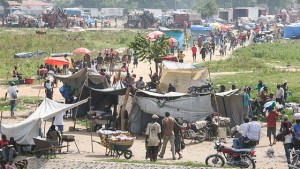 WASHINGTON, United States, Monday August 17, 2015 – The United States is urging authorities in the Dominican Republic against engaging in mass deportations and to respect the human rights of all deportees, after Santo Domingo this weekend resumed the process of repatriating undocumented immigrants.
WASHINGTON, United States, Monday August 17, 2015 – The United States is urging authorities in the Dominican Republic against engaging in mass deportations and to respect the human rights of all deportees, after Santo Domingo this weekend resumed the process of repatriating undocumented immigrants.
The deportations are in keeping with a 2013 court ruling that stripped citizenship from children born to immigrants who did not have legal status in the country, many of whom are from neighbouring Haiti, which shares the island of Hispaniola with the Dominican Republic. A law was subsequently passed, allowing some migrants to apply for residency by June 17 and more than a quarter million people submitted applications.
Deputy spokesperson in the US Department of State Mark Toner said in a statement that while the US recognized “the prerogative of the Dominican Republic to remove individuals from its territory who are present without authorization”, it wanted authorities to do so “in a transparent manner that fully respects the human rights of deportees”.
“Deportation procedures must adhere to clear, publicly available and verifiable protocols and procedures. Dominican nationality and migration policies and practices should be consistent with Dominican law and the Dominican Republic’s international obligations and commitments,” he said.
“We urge the government of the Dominican Republic to permit the observation of deportation proceedings by civil society groups and international organizations, such as the International Organization for Migration and the Office of the United Nations High Commissioner for Refugees, including at the borders.”
Toner said the US was still very concerned that people with a right to citizenship, or otherwise eligible to remain in the Dominican Republic, may not have had sufficient time and means to access the processes to regulate and formalize their status and have their claims adjudicated.
“Therefore, it is imperative that the Dominican Republic effectively screen people potentially subject to deportation to determine if they are Dominican citizens, require international protection, or are eligible for naturalization or regularization. In all cases, the Dominican Republic should take measures adequate to prevent the risk of statelessness and the discriminatory confiscation of documents,” he said.
The US official further encouraged officials from both countries to consult and collaborate with each other to develop effective processes and procedures for the safe and orderly return of migrants across their shared border.
Those processes, he said, should be consistent with each country’s international obligations and commitments, uphold the rule of law, provide procedural safeguards to guarantee appropriate treatment of deportees, and facilitate the immediate return of individuals deported from the Dominican Republic who have a right of citizenship or presence in the country.
Toner said the US would continue to actively monitor developments in the Dominican Republic, and engage that country’s government “to ensure the protection of human rights, encourage social inclusion of all people, and work to prevent the arbitrary deprivation of nationality for legal citizens”.
